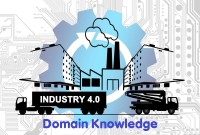- Home
- Business Processes
- Industry Knowledge
- Aerospace Industry
- Automotive Industry
- Banking Domain
- BFSI Industry
- Consumer/ FMCG Industry
- Chemicals Industry
- Engineering & Construction
- Energy Industry
- Education Domain
- Finance Domain
- Hospitality Domain
- Healthcare Industry
- Insurance Domain
- Retail Industry
- Travel and Tourism Domain
- Telecom Industry
- Leadership Skills
- eLearning
- Home
- Leadership
- Leadership Styles
- Assess Your Career Values
Assess Your Career Values
The best career choices are ones that match your values. Each person has several values that are important to him. These values are highly personal and knowing them provides a clearer sense of what's most important to you in your life and career. Career values are the beliefs you consider important from a work standpoint. Values help you understand what you want from a job? Explore a few examples of work values that can influence career path and job satisfaction.
Most of us don't know what we want from our life, our job. We think we do, but we really don't. Most of the time, we only know what we don't want. Do you know what your life's topmost preferences are? Do you know what matters to you the most? How to find out what makes you happy, what is it around which your life evolves? Knowing specifically what you want is much different than knowing what you don't want. Once you know what matters to you, your intentions get focused and you channelize all your energies to accomplish that.
Initially, everyone has difficulty with this question because the answer is hidden deep within you, buried beneath a sea of shoulds. Over time, this self-awareness can become almost invisible if we let it. Find out what is most important and what is it that you truly want.
Recognize that to be happy, you must live the life that you truly want to live. It's your life and you are the only one who can truly determine what is right for you. We are just trying to help you with one tool that can start the process of introspection, helping you ask yourself what you have inside. Follow not what you are told, but what you are and what you love..."
My Values (What matters most to me?)
The following is a list of personal values that many people have identified as being important to them in their careers. To begin exploring your own personal values, look at the list of values that follows. These values describe a wide variety of attributes most people want to achieve in their life at varying levels. Watch our video to understand what these values mean and how they influence your life. Rate the degree of importance in choosing a career for yourself and shortlist what matters most to you by selecting five values that are the most important to you and list them in the space provided for values in the worksheet.
1. Independence - Freedom to think
Freedom of thought (also called freedom of conscience or ideas) is the freedom of an individual to hold or consider a fact, viewpoint, or thought, independent of others' viewpoints. I want to have the freedom to think, time available for myself, and freedom to act as per my conscience
2. Expertise – Strive to be a Master
Expertise is a special skill or knowledge that is acquired by training, study, or practice. Expertise helps you stand out from the crowd and builds your reputation. To pursue learning and to become a known authority on what I do is my dream. I want to be a MASTER.
3. Social Service – Make a difference to Society
Social workers choose to impact the lives of those they encounter. The smiles and gratitude from the people you help are priceless. I want to make a huge difference to the society I live in. Helping fellow human beings gives me happiness
4. Friendship – Building Strong Networks
A recent Harvard study concluded that having solid friendships in our life even help promote brain health. Friends also help us handle stress, make better lifestyle choices that keep us strong, and allow us to rebound from health issues and disease more quickly. I want to spend time with people I like and I enjoy working hard to make them like me
5. Wealth – Enjoying Wealth the Honest Way
Wealth refers to the value of everything a person or family owns. Seeking true wealth may mean seeking deeper relationships, more personal growth, or ways to create more meaning in life. Achieving true wealth means possessing the ability to enjoy the small, ordinary pleasures of life. I want to attain wealth in a way that makes me truly happy and fulfilled. In the pursuit of wealth, I feel accomplished.
6. Family – What matters most to me
Imagine life as a game in which you are juggling some five balls in the air. You name them - work, family, health, friends, and spirit - and you're keeping all of these in the air. You will soon understand that work is a rubber ball. If you drop it, it will bounce back. But the other four balls - family, health, friends, and spirit - are made of glass. If you drop one of these, they will be irrevocably scuffed, marked, nicked, damaged or even shattered. They will never be the same. You must understand that and strive for balance in your life.
I want to have time to share with my family. My family is what matters the most to me.
7. Power - To be in Control
People with high self-control are happier. We all want to be happy. And to be happy we need to feel in control. I find happiness when I am in Control. I want power, control over others.
8. Leadership – To be influential
The happiest people make the best leaders, and conversely, unhappy people don't make good leaders. In fact, the best leaders put their own interests ahead of others and are happy as a result of doing so. I find happiness in being a Leader, to become influential.

9. Stability – Feeling a Stable and Secure
A stable routine gives your life structure and makes you feel in control. Living and spending time in a loving, secure, and stable environment is incredibly important for all of us. It is necessary for growth and success in life. What matters most to me is to have a stable and secure position.
10. Self-Development – Challenges that make me develop my Skills
The journey of self-improvement is an ongoing process of constant learning. It gives you the opportunity to evaluate your strengths and weaknesses and to work on them. Deciding to walk the path of self-improvement and personal development gives your life purpose and meaning. What matters most to me is to have a job that is challenging and provides me with opportunities to grow
11. Location – I live where I want
For many people, the work location is an important criterion when searching for jobs. Office location is important because it affects employee job satisfaction and work/life balance. I want to live where I want to Live. Location is very important to me!
12. Achievement – Pursuit of something Worthwhile
Achievement is important for us to perform better. Achievement is more important than material or financial reward. Achieving the aim or task gives greater personal satisfaction than receiving praise or recognition. Achievement gives us such an incredible sense of satisfaction. To achieve important goals matters most to me. I want to constantly engage myself in pursuit of something worthwhile!
13. Enjoyment – Enjoy the Job & Life
Enjoyment, understood as a positive impression due to positive stimuli, or otherwise feeling of satisfaction, is an indispensable element of a balanced life. But enjoyment also means pride in doing a good job, a sense of satisfaction, well-being, love, affection – all the things in life that make your heartbeat. I want to enjoy my job and have fun doing whatever I do!!
14, Self-Respect – My esteem is important
Having self-respect helps others to see and treat you with dignity and worth. Often the backbone of self-respect is knowing your values and living by them. Having self-respect often means that you need to stand by your character and be willing to defend your values and actions. My image and self-respect matter to me most. I want to be regarded as successful!!
Download the template provided here free of cost and use the template to shortlist five top values that matter most to you. These values will be used in a later exercise to understand your career options and developmental plan.
Related Links
You May Also Like
-
Stress is an essential part of our life. No one can live without stress. Stress can be beneficial as well as harmful. Stress as a positive influence adds excitement and hope while as a negative influence it can result in destructive feelings, anger, and depression. Although the general orientation to stress is to consider unfavorable outcomes, yet one must have observed that stress experiences may also facilitate the development of effective and varied coping behavior, increased personal resources, and lead to a sense of competence in development. Stress at a moderate level is not only inevitable but may be useful for physical and mental well-being.
-
Understanding Corporate Strategy
Management outlook and procedures have been revolutionized by more and more innovations over the recent years. It is no longer possible to follow traditional approaches to develop your organization's direction, its management as well its effectiveness. Senior managers need to be good decision-makers. In this section, we introduce concepts for strategy, strategic planning, strategic leadership, their exact meaning and associated terms, and how to use them.
-
Evidence of the medically damaging symptoms of work stress necessitates applying the treatment of stress management. Stress management is increasingly drawing the attention to the management experts not only as a remedial measure but also as a way to resource management. If the workplace can be made a little more lovable the increase in the achievement of the organization may be much time more. If group stress can be removed by introducing group discussions and recreational facilities a long-lasting team spirit may get developed.
-
Building Your Domain Knowledge
Domain knowledge from a career management perspective encompasses the understanding of industry dynamics and business processes of the target operational area. Domain expert exhibits clear knowledge in the respective industry and understands the industry concepts in general. It is always recommended to best highlight your exposure of domain in your resume or cover letter. TechnoFunc provides you with the best tutorials to gain domain knowledge in a large number of industries and business areas.
-
Robert Katz identified three leadership skills called - technical skills, human skills, and conceptual skills as the basic personal skills essential for leadership. Leaders must possess these three skills that assist them in optimizing a leader's performance. Technical skills are related to the field, human skills are related to communicating with people and conceptual skills related to setting the vision.
-
Emergent leadership occurs when a group member is not appointed or elected as leader, but rather that person steps up as the leader over time within-group interactions. Have you ever faced challenges in getting accepted into your new role of position as a leader? Groups don't automatically accept a new "boss" as a leader. Emergent leadership is what you must do when taking over a new group. Learn more about emergent leadership.
-
Navigating your career journey will hopefully include a series of experiences that challenge your skills and abilities in ways that are satisfying and rewarding. Only you can manage your career. That means you must determine what things you are passionate about, what your goals are, both professionally and personally, and how much energy you are willing to invest along the way. Learn how to build an effective career path framework for yourself.
-
Tools for Developing Your Team
If a manager has too many weak spots in the talent of the team, the ability to empower the team members to independently execute the project is impaired. Assignments fall behind schedule or stretch out because the needed skills or knowledge are not in place when needed. To successfully execute important projects, hiring talented people, and increasing the talents of existing staff are most important.
-
In today's business world, proficiency in management skills is essential for career growth and success. Managerial skills can be defined as attributes or abilities that are essential for every leader and manager to succeed and fulfill specific tasks expected from them by the organization.
-
Discover Your Career Direction
The process of finding career direction begins with specific career exploration and identification of a career that could be passionate about, a career that allows you to make the optimum use of your talents. After identification of the career, you need to acquire skills and tools, and education that can help you get entry into your dream career. Learn the important tips that you cannot afford to miss.
Explore Our Free Training Articles or
Sign Up to Start With Our eLearning Courses

About Us
Learning
© 2023 TechnoFunc, All Rights Reserved









